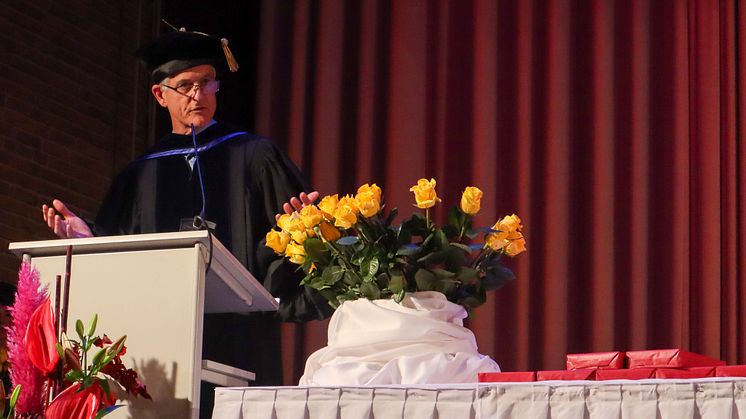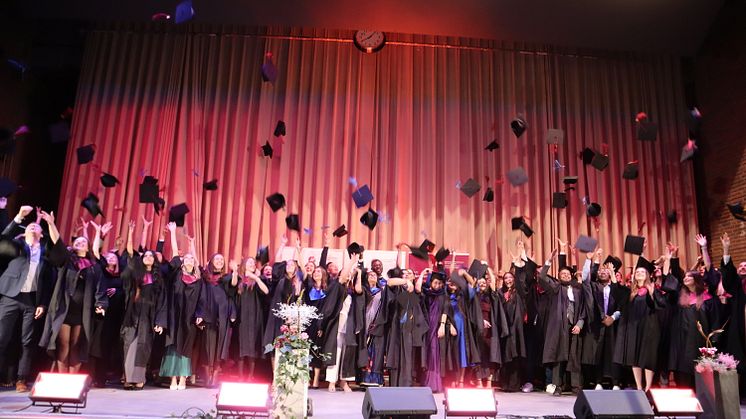
Blog-Eintrag -
Emotionale Worte eines Studiengangsleiters im Rahmen der Absolventenfeier
Der Abschluss des Studiums ist für jeden Studierenden ein wichtiger Meilenstein. Besonders emotional wird dieser Moment vor allem dann, wenn der Studiengangsleiter eine Rede an die Absolvent*innen richtet und ihnen Ratschläge und Mut für die Zukunft mit auf den Weg gibt.
Bei der diesjährigen Absolventenfeier der Hochschule der Wirtschaft für Management (HdWM) hielt Prof. Dr. Michael Cofrin eine emotionale Rede, die alle Anwesenden zum Nachdenken anregte. In seiner Rede riet Prof. Michael Cofrin den Absolvent*innen, bei allem, was sie in Zukunft tun, immer wieder die eigene Denkweise zu hinterfragen und sich gegenüber neuen Menschen und Perspektiven zu öffnen.
Im Folgenden könnt ihr die Rede von Professor Cofrin in englischer Sprache nachlesen und euch von seinen Worten inspirieren lassen:
"Good evening colleagues, parents and other family members and graduating students. This ceremony celebrates the hard work and perseverance of every student here tonight. All of you students sitting here before me have demonstrated various degrees of the capacity to gain, process, and assimilate knowledge and to some extent, to think critically, presumably more critically than when you began your studies.
After this chapter of your life, you will be faced with many choices throughout the rest of your life, some of which will be very challenging. You, the creator of your destiny, will have the freedom to decide. You will have the freedom to apply the knowledge you have gained in life, including the knowledge you have gained from this university.
But the knowledge you’ve gained or the freedom to make your own decisions is not the focus of my speech tonight. I would like to talk about another type of freedom, the freedom to choose HOW you think and the significance and impact of how you choose to engage with others. This might seem like a trivial point, but it nonetheless has tremendous impact on our lives.
In Plato’s allegory of the cave, Socrates asks Plato’s brother to imagine prisoners who have been in a cave their entire life, and have only experienced shadows cast on the wall before them. The shadows are their only reality. One of the prisoners escapes and later returns to tell the other prisoners about his discovered truths, but he is blinded immediately after entering the cave. The prisoners do not believe him and attribute his blindness to having left the cave. Consequently, the other prisoners threaten to kill all who attempt to leave because they will experience the same harm by leaving the cave.
This allegory is like other similar parables that illustrate how prone we humans are to interpreting and adhering to our realities that we create based on our experiences and belief templates. Thinking solely based on our default template ensures that we, like the prisoners in the cave, remain prisoners and are never really free.
Like the prisoners in the cave, day after day after day, we persist in our thoughts as if on autopilot, as if the way we construct meaning from the world is not an intentional choice but instead the result of an autonomous predetermined process. Like the prisoners in the cave, our internal scripts often preclude us from a more critical awareness about ourselves and our certainties. And like the prisoners in the cave, any analysis of the origins of our beliefs and the personal biases we form, yields to the dominance of our self-centered default templates.
This type of biased, default thinking and its effects on decision-making is nothing new. The famous behavioral economics research pair, Kahneman and Tversky, demonstrated over numerous experiments of how our default mode of thinking can lead to biased interpretations or conclusions. Researchers in psychology have also demonstrated how we are also terrible at accepting evidence that challenges our beliefs. Faced with the choice between changing one’s mind and proving that there is no need to do so, almost everyone gets busy on the proof, as so aptly stated by the economist Kenneth Galbraith.
Now, perhaps you learned about this type of thinking in your Applied Business Psychology or Critical Thinking in Management course. But I would like to take it a step further and put forth a claim. This type of thinking results in relatively harmless outcomes for individuals, but it can be catastrophic when a sufficient number of people emerge who identify with and align closely with a common reality and yield to no other reality. This collective group dynamic can be exploited in horrific ways. We’ve seen plenty of examples in history and we’re seeing examples across the globe today. As an American, I have watched my country lose its soul, as the democrats and republicans have become ensnared in their own moral universes, resulting in an extremely polarized civil-war-like ideological food fight, which has created a suitable climate for the type of exploitation I am referring to. And now we have sadly seen the results of this exploitation.
Here in Europe, most of you in this room have grown up in a culture of collaboration and compromise, yet this becomes increasingly strained by unyielding strong beliefs and convictions. My message to you graduates is, yes, stand tall with your convictions but not to the extent that your thinking and actions preclude other possibilities and your actions become rash or heedless, like the prisoner in Plato’s Cave. I think this is the most important challenge in education today and in civil discourse, a challenge we all face, freeing us from Plato’s Cave. Freeing ourselves to recognize and question the origins of our thoughts and beliefs, freeing ourselves to gain critical awareness about our certainties and becoming less arrogant about our beliefs, and freeing ourselves to be more empathic towards others’ experiences. This, graduates, is what I mean by the freedom to choose how you think and the significance and impact of how you choose to engage with others.
This ageing professor in a Dumbledore gown, who is still grieving, has a request, in fact a plea, a plea for every one of you to be ambassadors of civility, to choose to listen, to choose to consider other perspectives, even in the mundane matters of your daily routines and to choose to see the humanity in others. We can’t lose this basic approach to life. We can’t lose this basic approach to civic engagement. It’s vital for the strength of democracy. It’s vital for Germany and it’s vital for Europe.
Thank you, congratulations graduates. Good luck to you all!"


